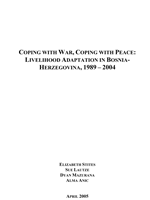This study uses a livelihood framework to examine and analyze household livelihood strategies across three time periods in six rural villages in Bosnia-Herzegovina. The three time periods examined are the ending of the Cold War (1989), the height of the conflict, and late 2004. The study focuses on the ways in which households adapted their livelihood strategies to respond to drastic changes in access to assets, shifts in coping strategies, and the resulting livelihood outcomes as they experienced changes in their political, social, and economic environment.
Three broad factors have shaped household livelihood systems in rural Bosnian over the past fifteen years: the transition away from a socialist economy, armed conflict (1992-1995), and the postwar reorganization of society. Households responded to these events by using both short term coping strategies (such as changes in consumption, household composition, and location) and long term adaptations, including extensive shifts in the nature of livelihood strategies.
The six villages selected for the study lie along the former front line of the war and were heavily affected by the fighting. The villages differ based on ethnicity, geography and wealth. At the same time, the populations all share experiences of displacement, exile, and return in the postwar period. In 2004 when the study was undertaken, the six villages were inhabited almost entirely by households that had returned, under the provisions of the Dayton Peace Agreement, to their original village in the postwar period.
Study data is based on qualitative and quantitative data collected in six villages in August-November 2004. Teams of trained Bosnian surveyors and team leaders from FIFC and Mercy Corps carried out the study.







